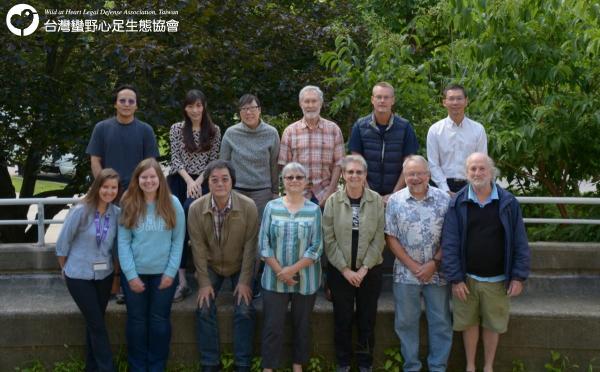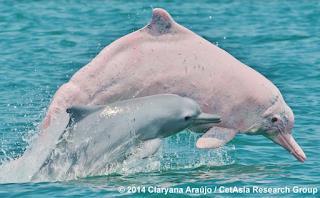News update
Taiwanese white dolphin: International Collaboration for Recovery Plan

In August of 2019, Wild at Heart Legal Defense Association (Wild at Heart) and Matsu Fish Conservation Union (MFCU), organized an international workshop for the purpose of producing a recovery plan (as attachment at the end of this article) to identify the actions needed to stop the decline of the TWD and promote their recovery. Sixteen international experts, including experts on the TWD, cetacean biology and ecology, bioacoustics, and conservation policy, and representatives of Taiwanese and international NGOs and Taiwan's Ocean Conservation Administration, gathered at the University of Western Ontario in London, Ontario, Canada for a four day workshop to produce a recovery plan.
The Taiwanese white (or humpback) dolphin (TWD), was first discovered in 2002 and was scientifically classified as a distinct subspecies (Sousa chinensis taiwanensis) of the Indo-Pacific humpback dolphin in 2015. With likely no more than 65 individuals existing they have been classified since 2008 as Critically Endangered by the IUCN Red List of Threatened Species, and Endangered by the US Endangered Species Act in 2018.
The massive development of windfarms along Taiwan's densely populated west coast represents a new threat to Taiwanese white dolphins, since it involves a substantial increase in boat traffic and construction noise, as well as functionally reducing the extent of their habitat. The proliferation of windfarms could also result in fishing efforts becoming more concentrated in the dolphins' nearshore habitat. These negative effects on a critically endangered subspecies could be offset by eliminating the greater threat of entanglement in fishing nets.
Immediate Actions Recommended
A ban on gill and trammel nets is the single most urgently needed action, according to the experts. If effectively enforced, such a ban would immediately halt the dolphins' decline. The group proposed a creative solution: Companies and financial institutions involved in ongoing offshore windfarm development could help finance government programs to eliminate gill and trammel nets from dolphin habitat.
“There is a 'win-win-win' solution but the windfarm developers, government agencies and fishers all have to adopt and implement that solution immediately to save the dolphins,“ said Dr. Kurtis Pei, of the National Pingtung University of Science and Technology. “As we note in the recovery plan, the developers win, through resolving their conflicts with the fishing community and blunting criticism. The fishing community wins, through receiving adequate compensation. Most importantly, the Taiwanese white dolphins win, as they no longer die in gill and trammel nets.”
The experts also identified five other actions that may not have immediate effects, but must be implemented quickly for sustained dolphin recovery:
- Locate any new development and related impacts away from the dolphins' habitat;
- Establish mandatory routes and speed limits for vessels to reduce both noise and the risk of vessel strikes;
- Reduce air, water, and soil pollution;
- Increase natural river flows; and
- Establish regulations to limit human-caused underwater noise levels in dolphin habitat.
“Taiwan could become the first jurisdiction to save a critically endangered dolphin or porpoise from being lost due to entanglement in fisheries,” said Dr. Randall R. Reeves, chair of the International Union for Conservation of Nature Species Survival Commission Cetacean Specialist Group. “It would be a tremendous accomplishment for Taiwan, its people, and the dolphins.”

“Recovering Taiwanese white dolphins will require solid scientific advice, hard work on the part of stakeholders in industry and government, and a plan”, said Dr. Peter Ross, chair of the international Taiwanese White Dolphin Advisory Panel and vice president of Ocean Wise. “I am delighted at the clear and practical plan designed by these international experts. This roadmap provides perhaps the best chance for us to save this charismatic icon of the Eastern Taiwan Strait. The time to act is now.”
Wild at Heart Legal Defense Association, Taiwan (http://en.wildatheart.org.tw) is a not for profit civic association founded in 2003. Contact: Robin Winkler, +886-937548722, [email protected].
Matsu Fish Conservation Union (http://twsousa.org.tw) was founded in Taiwan in 2006. MFCU is a coalition of social and environmental activist organizations committed to raising awareness of the environmental, social and economic issues surrounding the plight of the critically endangered Taiwanese white dolphin.Contact: Cindy Hsu, +886-930813999, [email protected]